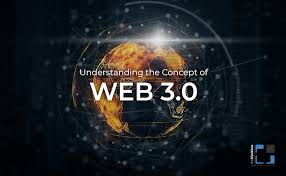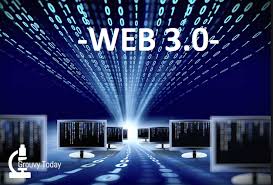Decentralized Internet Is The Future
The Solution To Internet Censorship Using Blockchain
Ben Armstrong (Bitboy Crypto) does a great job of describing the biggest problem with the internet

[the_ad id=”5879″]
https://youtu.be/_rB6vjvYjNE
The Internet Is Rotting Away
205,228 viewsNov 11, 2021
1.4M subscribers
In This BitBoy Special: The Internet has a problem and if we don’t fix it soon, it could affect history as we know it. The internet was created to be decentralized, but along the way we’ve lost that, leading to where we are today. The internet allows us to be connected to anyone, anywhere. But there’s a major problem that no one is talking about: link rot. In this video, we’ll go in-depth about the problem with the internet today and why we need to fix link rot before it’s too late. Learn about the history of the internet and where the future of the internet could be headed. Sources: https://www.theatlantic.com/technolog… https://www.theatlantic.com/technolog… https://www.fastcompany.com/3028321/d… https://www.theverge.com/2021/5/21/22… https://www.cjr.org/analysis/linkrot-… https://www.theverge.com/2021/3/25/22… https://www.weforum.org/agenda/2018/0… https://gcn.com/articles/2013/10/04/s… https://arstechnica.com/information-t… https://www.cjr.org/analysis/linkrot-…***********************************************************
Decentralized Internet Is The Future

VISIT OUR OTHER SITES:
Check Out Our Crypto Privacy Site: CryptoGrizz.com
Check Out Our Crypto Trading Site: CryptoGrizzTrader.com
Check Out Our Low Cap Altcoin Site: CryptoGrizzAltcoins.com
Check Out Our Prepper Site: PrepperGrizz.com
Check Out Our Global Crypto Survival Site: GlobalCryptoSurvival.com
FULL VIDEO TRANSCRIPT
00:00There is a problem with the internet.00:02And if we don’t fix it,00:05then let’s just say the internet may not be around for long.00:20The internet is the greatest technological revolution00:22we’ve seen since the creation of the vacuum tube in 1904.00:28This little guy is what made electronics as we know them today possible.00:33It allowed humans to communicate in a way that we could have never possibly anticipated.00:43Back in the 1960s,00:45a bunch of real nerds with actual pocket protectors00:48create a communications network where computers could speak to one another00:53through phone lines.00:55Much later, this network would become a public internet or a WorldWideWeb.01:01And that occurred 30 years ago this year.01:05On August 6, 1991,01:08Tim Berners-Lee created a post on a Usenet group announcing this concept of a WorldWideWeb.01:15And that’s when things really took off and innovation went parabolic.01:21Humanity started seeing the potential of all these connections.01:25Connections with thousands of servers multiplied by thousands more servers01:30multiplied by thousands of computers eventually created an internet.01:36And we got really good at making these connections.01:40This is because the core instructions of the internet, its protocols, were open source.01:45You see, the internet was born to be decentralized.01:49Anyone with a computer and a phone line01:52can connect to someone else with a computer and phone line01:54and trade zeros and ones.01:58The potential of connection is so simple but, at the same time, incredibly strong.02:05The beauty of the internet, the thing that allowed it to grow,02:08is the ability to make instant connections.02:12Information can be exchanged as soon as a connection is made,02:16so the bigger and better we make those connections,02:19the faster the internet will become.02:25So 30 years later, we have an internet so fast, so connected, so pervasive,02:30that we can do things that weren’t even possible just two years ago.02:34The high watermark of communications in the 90s was video conferencing.02:41Today, it’s so common02:43that it’s almost become the standard way that we do a doctor’s visit.02:48The special sauce of the internet,02:50its instantaneousness,02:52has also become its biggest flaw.02:55The internet was not built to last.02:58It was built to connect.03:00That’s it.03:01There’s nothing permanent about the internet.03:04And that’s starting to become a big problem.03:09We think of the internet as long connections that are untouchable by most people.03:13Private.03:15The websites and apps we use are colorful and welcoming.03:18It’s high-tech, modern, progressive.03:21We think the guts of the internet,03:23servers, data centers and cables,03:25are tucked away, left alone like monks on a mountain to quietly do their work03:30and only every once in a while, need a refresh or a reboot.03:36But the truth is,03:38the internet has a problem that experts have known about for decades.03:43And if we’re not careful,03:44it could bring the entire internet down03:47and affect history as we know it.04:07This is War and Peace.04:10It’s a large book written by a Russian man.04:14And it’s mostly depressing.04:15Today, this book is available on eReaders.04:19And a lot of people have purchased it that way.04:22But one day,04:24War and Peace fans notice something very peculiar about the book.04:33When the flame of the sulfur splinters Nookd by the tinder burned up,04:38first blue and then red,04:39Shcherbinin lit the tallow candle.04:42Beautiful, isn’t it?04:45There’s only one problem.04:46How are splinters Nookd?04:49They aren’t.04:51They’re kindled.04:53Customers who bought the War and Peace eBook through Barnes and Noble’s eReader, the Nook,04:58discovered this, and they complained.05:01Come to find out, an algorithm created by the Barnes and Noble marketing team went rogue05:07and replaced the word “kindle,” the name of Amazon’s eReader,05:12with the name of their own eReader,05:14Nook.05:15Funny, isn’t it?05:16No one accepted blame,05:18and there was no record to try to track down.05:22Everything in the eBook world is centralized and controlled by mega corporations,05:29corporations that can control and manipulate the stories05:34that have affected and shaped our society and culture.05:38This is a legal opinion from Judge Samuel Alito05:43from a case in 2011.05:45In this opinion, Judge Alito did whatever everyone did.05:50He cited a source and linked to it.05:53But in this opinion,05:55the owners of the page that he linked to changed the website06:00to display a 404 message that read06:03Aren’t you glad you didn’t cite this webpage06:06like Justice Alito did06:08This is still in the Library of Congress,06:11and it hasn’t been fixed yet.06:13It’s a matter of United States law.06:16And this is just the tip of the iceberg.06:19According to a report by Harvard Law School,06:2249% of all links in United States Supreme Court opinions are dead or have drifted to different content.06:31And this is not just concentrated to the Supreme Court.06:35home deeds06:37medical research06:38scientific journals06:40hospital records06:41government records06:45Our photo and video memories are on a server, SD card or hard drive.06:51Some of you watching this video have never even physically held a picture that you’ve taken.06:59If you lose your phone,07:00no problem.07:02It’s all backed up somewhere, right?07:04All of our digital memories,07:06photos, music, videos,07:10they require electricity to survive,07:13and without it,07:14well, they cease to exist.07:17But servers go down,07:19bits can flip,07:20and faulty hard drives can corrupt every memory that you thought that you had,07:27making them little more than, well, a memory.07:36The average lifespan of a hard drive is around four years old.07:40For an enterprise level solid-state drive,07:4410 years.07:45Compare that to film, photos and vinyl records.07:49Over 100 years, if stored properly.07:59The problem is called link rot.08:01And it’s been eating away at the foundations of the internet for the past 25 years.08:07Links are the backbone of the internet08:10that would allow us to go from one webpage to the next08:12without typing in a complicated and exact URL address.08:16Without hyperlinks,08:17the internet is slow and clumsy.08:21But it’s not just link rot.08:23It’s the fact that changes on the internet can happen.08:26And the only record of those changes, if there even is one, is located on a server08:31that only a few have access to.08:33It’s like building a massive structure and then leaving it open to the elements.08:38Our data is rotting away faster than we can possibly back it up.08:44Centralized powers and Silicon Valley are editing, censoring and banning protected speech.08:51News outlets are rewriting articles under the radar,08:55something called ninja editing,08:57to save face, get out of a lie, or to change history to fit the present narrative.09:03How can we learn from the past09:05if history has been rewritten a thousand times behind an opaque curtain?09:11What happens if the government need some land and your house is on that property?09:16Edit the record.09:18What happens if a political candidate make some comments09:21that suddenly now are deemed unsavory?09:24Edit the record.09:25But it only gets darker from here.09:29What if the photos from your newborn baby’s first bath are crawled by an algorithm09:34searching for child porn and delete it and your flagged by the FBI?09:38Your Apple ID is placed on a watch list.09:41Suddenly, you’re banned from air travel.09:44Charges are pressed.09:46Your name and face are placed on a list of sex offenders.09:50And you have no recourse because the string of events09:54that led to your photos getting flagged and deleted09:57are locked up behind a centralized system.10:00These things are happening now and will only get worse.10:06If only there was a technology that was open, searchable, resistant to change,10:11and extremely difficult to hack.10:26Blockchain won’t fix the internet or history,10:30but it can make it more honest by making it more transparent and more decentralized.10:37A court decision can be placed in a database that runs on Cardano10:42where it’s logged and verified by thousands of nodes,10:46and any changes that occur will be recorded forever on the ledger.10:51Public voting can be done on a blockchain with no possibility that errors go unnoticed.10:58Your medical data can be placed into a record system that runs on Ethereum11:03where you can completely control who has access to what.11:08Your photos, music and videos can be backed up by a storage-based blockchain11:14where thousands of users back up your data at the same time.11:19A presidential news conference can have an embedded blockchain string11:23woven into the video feed that verifies its integrity.11:27This means no deepfakes and no Photoshop.11:31The internet is not meant to be locked up behind a wall controlled only by a few.11:38It needs constant care.11:40Blockchain is always moving, perpetually upgraded in one long chain that lasts forever.11:47It’s not just the future of finance.11:50It’s the next evolution of technology that will democratize our future and our freedoms. English (United States)
